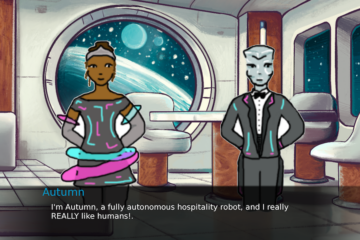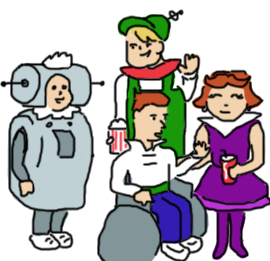Since the very first convention I attended, I wanted to be on programming. This was partially because I saw how BAD some people were at it, and I knew I could be GOOD. I knew how to keep a conversation moving, how to stay on topic, and I had interesting things to say. This was honest self-knowledge. I’d worked hard on these skills.
The first time I applied to be a part of a Convention’s programming, it was the first ConCoction in 2015. I’d sold 5 short stories and was fresh on getting “Story of the Year” from Apex Magazine for 2014. It had just been announced that this new convention was happening, and I immediately emailed the organizers asking if there would be literary programming, and if so, if they were interested in local authors like the members of my writing workshop, who had Hugos and Nebulas and real accolades, and incidentally, oh, maybe… me. The response was a quick “No.”
The next year, ConCoction announced they WOULD have literary programming, and again I messaged, asking if I could be included, and again I was told no, thanks. However, my buddy S. Andrew Swann DID get on programming, and he ended up on a panel all by himself because the other panelists cancelled. He asked the workshop in general if anyone could come do this panel with him, and I leaped at the opportunity.
The panel was a late-night Friday discussion of porn and erotica and related topics. I had sold an erotica piece! Just one, but yeah, I had things to say! We talked about consent in fiction, fantasy in fantasies… it was a great time. I wasn’t officially “on” programming, didn’t get a ribbon for my badge or anything, but I felt like, “YES. Now I can use this experience to request to be on programming next year!”
Next year came and … I didn’t get on programming.
For the next three years, I applied and applied to every convention I could, and didn’t get on anything.
I complained to my buddy Charlie, and he said, “You should be on programming. You’re up-and-coming. Let me talk to my friends at Confluence.”
Confluence programming emailed me immediately that they’d gotten Charlie’s recommendation, and added me to programming the very next year! Officially, this time, with a badge ribbon and a little folding tent with my name on it! People were treating me like someone important! It was a giddy experience.
All it took was good, old-fashioned American Know Who.
I kinda hated that. Though the Confluence people, happy with my performance on my three panels, invited me back the next year (and every year since, I should add!), I had yet to break into a convention on my own merit, rather than a more established (white male) author friend bringing me on board.
A straw broke for me when my buddy, Mike, got on five panels at WorldCon San Jose in 2018. I’d applied, now with dozens of publications and proven experience moderating panels, and gotten nothing. No offense to Mike, but his only publication is his work on the video game Artemis. I complained to him, “What’s the deal? What do I have to do?”
Here was Mike’s advice: wait until a week or two before the convention, and email the programming chair asking if they need volunteers to fill in for panelists who have cancelled.
I was way too shy to do that, I thought.
Covid happened, but when DisCon was announced in 2021, I applied to be on program, did not get on, and bought my ticket to D.C. anyway. I arranged to stay with my friend Haizle, so the trip wouldn’t cost much. Then, two weeks before the convention, I emailed programming, asking if they needed volunteers to take the place of people who had cancelled. LOTS of people had cancelled, as Covid surged yet again. I was put on a LOT of panels.
Ever since then, I have had no trouble being put on programming, as I add to my application “I have moderated panels at WorldCon.”
NOW… this history, as I look back on it, sets up the following attack to get your butt into the panelist seat:
- Know someone who knows someone, or pull the last-second-fill-in trick.
- Volunteer to moderate – they always have fewer people willing to do that.
- Do a great job, be courteous and professional, and you will be asked back again and again.
Both knowing someone who knows someone and taking advantage of the poor program coordinator’s last-minute panic feel kind of dirty, but so is sticking your foot in a door that’s about to close. The method and motive are the same: you are one of tens of thousands of published authors looking to hustle their books, they don’t know you, and putting an unknown person on programming is a risk.
Bad actors do bad things on panels. I’m not even talking about the sudden dropping of a slur in the middle of a conversation… there’s micro-aggressions, aggression-aggressions – talking over people, beginning every single question answer with, “Well, in my book…” And that person who says the same thing five times in a row because they don’t know how to stop talking. The program coordinator doesn’t want to be the one issuing a formal apology for bringing you on board.
You can wait until you’re so famous the programming people think they know you already, or you can do a few things to get to be known:
- Volunteer for the convention staff. (I stocked bathrooms for WisCon! Monitored the bookstore for ConCoction! It was fun.)
- Be friendly and meet people at the convention. (UGH, I know. Social anxiety nightmare!) I’m not talking about Guests of Honor – those people aren’t running programming. Buddy up to the folks in the audiences or moving chairs.
- Join smaller events or groups – writing workshops, for example.
And above all, the most important step in getting on paneling is:
Don’t be afraid to ask.
(scary!)


